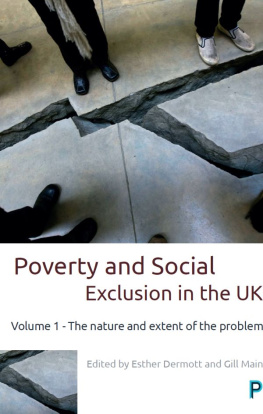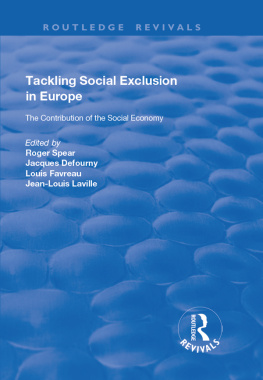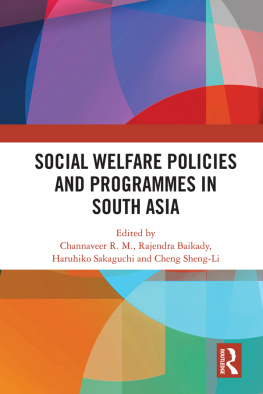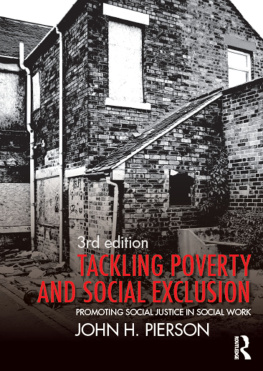WELFARE POLICY FROM BELOW
This book is dedicated to the memory of ourpiend Ian Taylor
His sociological imagination, good sense and sheer joy of living and working with people he liked have contributed immeasurably to this project. He did not see its completion. We miss him.
Welfare Policy from Below
Struggles Against Social Exclusion in Europe
Edited by
HEINZ STEINERT
J.W. Goethe-University, Frankfurt
ARNO PILGRAM
Institute for the Sociology of Law and Criminology, Vienna
First published 2007 by Ashgate Publishng
Published 2016 by Routledge
2 Park Square, Milton Park, Abingdon, Oxon OX14 4RN
711 Third Avenue, New York, NY 10017, USA
Routledge is an imprint ofthe Taylor & Francis Group, an informa business
Copyright 2007 Heinz Steinert and Arno Pilgram
Heinz Steinert and Arno Pilgram have asserted their moral right under the Copyright, Designs and Patents Act, 1988, to be identified as the editors of this work.
All rights reserved. No part of this book may be reprinted or reproduced or utilised in any form or by any electronic, mechanical, or other means, now known or hereafter invented, including photocopying and recording, or in any information storage or retrieval system, without permission in writing from the publishers.
Notice:
Product or corporate names may be trademarks or registered trademarks, and are used only for identification and explanation without intent to infringe.
British Library Cataloguing in Publication Data
Welfare policy from below: struggles against social exclusion in Europe
1. Marginality, Social - Europe 2. Europe - Social policy
I. Steinert, Heinz, II. Pilgram, Arno
361.6094
Library of Congress Cataloging-in-Publication Data
Welfare policy from below: struggles against social exclusion in Europe/ edited by Heinz Steinert and Arno Pilgram.
p. cm.
Includes bibliographical references.
ISBN 0-7546-4815-X
1. Marginality, Social--Europe. 2. Public welfare--Europe. 3. Europe--Social policy. I. Steinert, Heinz. II. Pilgram, Arno.
ISBN 9780754648154 (pbk)
Contents
Heinz Steinert
Ian Taylor
Georg Vobruba
Heinz Steinert
Heinz Steinert
Bridgette Wessels and Siep Miedema
Tomke Bohnisch and Helga Cremer-Schfer
Gerhard Hanak
Anita Rnneling and ngela Gabs i Gasa
Monia Giovannetti and Fabio Quassoli
Helga Cremer-Schfer
Henrik Tham
Tomke Bohnisch, Angela Gabs i Gasa, Monia Giovannetti and Fabio Quassoli
Bridgette Wessels
Siep Miedema and Janine Janssen
Gerhard Hanak
Fabio Quassoli and Tomke Bohnisch
Inge Karazman-Morawetz and Anita Rnneling
Bridgette Wessels, Janine Janssen and Siep Miedema
Christa Pelikan, Arno Pilgram, Heinz Steinert and Georg Vobruba
TOMKE BHNISCH sociology, cultural anthropology; Zentrum Gender Studies, University Basel.
HELGA CREMER-SCHFER sociology, education; professor, J. W. Goethe-University Frankfurt/Main.
NGELA GABS I GASA sociology; Barcelona.
MONIA GIOVANNETTI sociology; Bologna.
GERHARD HANAK sociology; Institut f. Rechts- u. Kriminalsoziologie, Vienna.
JANINE JANSSEN cultural anthropology; University of Groningen.
INGE KARAZMAN-MORAWETZ sociology; Institut f. Rechts- u.Kriminalsoziologie, Vienna.
SIEP MIEDEMA sociology, criminology; University of Groningen.
CHRISTA PELIKAN social history; Institut f. Rechts- u. Kriminalsoziologie, Vienna.
ARNO PILGRAM sociology; director, Institut f. Rechts- u. Kriminalsoziologie, Vienna.
FABIO QUASSOLI sociology; University of Milano-Bicocca.
ANITA RNNELING sociology; PhD student, Stockholm University.
HEINZ STEINERT sociology, social policy; professor, J.W.Goethe-University Frankfurt/Main.
IAN TAYLOR sociology; professor, University of Durham ().
HENRIK THAM sociology, criminology; professor, Stockholm University.
GEORG VOBRUBA political science, sociology; professor, University of Leipzig.
BRIDGETTE WESSELS sociology; lecturer, Sheffield University.
Heinz Steinert
Neo-liberalism and the old welfare state
Since we finished this book in 2003 the world hasnt changed decidedly, let alone for the better. The mode of production that we got used to calling neo-liberal (only the sociologists seem to prefer information or knowledge economy) has consolidated and acquired neophyte but powerful and determined participants in Asia. Since the 1980s, when this economic regime was kicked off politically by Thatcher and Reagan, practically everywhere in the world (including the European Union of twenty-five member states) the rich have become richer and the poor poorer; or at least the distance between rich and poor has widened. In Europe we also got used to double-digit unemployment figures and to governments inability to do anything about it. We also got used to social security reductions (lower unemployment benefits, old-age pensions, workplace security, welfare benefits) as a necessary answer to this situation necessary to keep the social security system financially sound and necessary to encourage more flexibility in the work force. At the same time that politicians spread fear and insecurity by declaring the social insurance system bankrupt which could easily be (and is) put right by increasing the tax contribution to its financing it seems to be similarly necessary to give corporations huge tax breaks that reduce their contribution to the welfare state.
In other words: when social security benefits are actually needed by the population, they get reduced and are made dependent on conditions that fewer people meet.
Even if we resign ourselves to the fact that this neo-liberal mode of production cannot be decidedly modified in the short- and middle-term, we could expect politics to work at a new system of social security that is adapted to the new situation. Instead, all we get is a dismantling of the old regime and the good advice to use private means of preparing for hardship (foreseeable or not) in our lives.
Welfare states with their enlightened European tradition should and can do better than that. From the research reported in this book into how people actually struggle with hardship and work their way out of difficult situations, we get good indications at what kind of infrastructure is helpful in these struggles against (impending) social exclusion. We can derive some guidelines for features which a new (European) system of social security, that is at least adapted to the conditions of neo-liberalism, should and could have in the service of those who most need it. Social security of the future should be understood as the provision of the social infrastructure we need to conduct the business of living our lives and to participate as fully as we care and wish to in society and politics.
Neo-liberalism has and this is the main redeeming quality to be found in capitalist development brought a new thrust of rationalization of production, this time mainly by electronifying (the present-day equivalent to the mechanization and higher organization of earlier stages) the intellectual aspects of work. This has made automatic production and complicated and precise work co-ordination possible. This has unfortunately also just made it possible to shift work to locations all around the world that offer the cheapest labour and, thus, inaugurated a new round of internationalized exploitation. (Capitalist rationalization can, but does not necessarily mean the reduction of risky or unpleasant work: it aims at the reduction of expensive wage labour replacing it by machines or simply by cheaper labour or both.) As far as this implies a genuine reduction of necessary labour it is what the progress of humanity is about: to set us free for those aspects of life that go beyond just surviving; develop our sensibilities and live a culture of dignity, wellbeing, thoughtfulness, and mutual help and enjoyment. Such reductions of necessary labour have, more prosaically, traditionally led to shorter working hours and, thus, to an equal distribution of the necessary1 wage labour again. This time, surprisingly, this logical consequence is out of the question, rather the tendency is to even raise working-hours again by rule and contract, or just in actual fact. This recent instant of progress has made life more demanding for all: managers, consultants and the wizards of financial speculation included. (We can control our pity for them: their stress is pretty gilded, but increased stress all the same.) It has made life more difficult for the poor, even in the rich and even more in the poor parts of the world.










